
A platform that encourages healthy conversation, spiritual support, growth and fellowship

NOLACatholic Parenting Podcast
A natural progression of our weekly column in the Clarion Herald and blog

The best in Catholic news and inspiration - wherever you are!
Confession ambulance: Driving mercy to the people
-
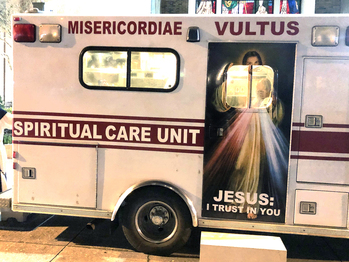
A medical ambulance is equipped to care for a physical emergency in a hurry. But, what about an ambulance that addresses spiritual wellness?
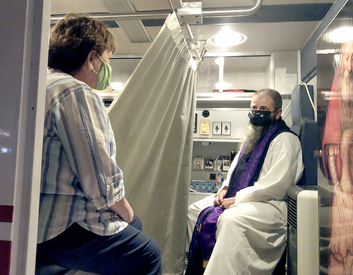 Father Michael Champagne, a priest of the Community of Jesus Crucified, drove his customized ambulance – he calls it a spiritual care unit (SCU) – from Lafayette and parked it outside of St. Catherine of Siena Church in Metairie March 8-10 while giving a three-day Lenten mission. He heard confessions from anyone stopping by.
Father Michael Champagne, a priest of the Community of Jesus Crucified, drove his customized ambulance – he calls it a spiritual care unit (SCU) – from Lafayette and parked it outside of St. Catherine of Siena Church in Metairie March 8-10 while giving a three-day Lenten mission. He heard confessions from anyone stopping by.“When the church shows up on (people’s) turf, it’s less intimidating,” he said. “People see it and start thinking about it. The Lord works on that thought.”
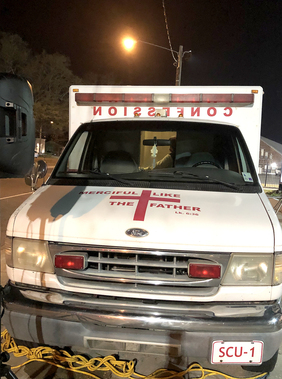 10,100-confession checkup
10,100-confession checkup
Father Champagne, originally from Leesville, Louisiana, began visualizing an ambulance for confession in late 2012 when Pope Benedict declared the “Year of the New Evangelization.” He finally procured a used ambulance in Texas on eBay in November 2015 after Pope Francis declared the “Year of Mercy” in 2015. Lafayette Bishop Michael Jarrell blessed it, and the rest is history.It’s been an amazing six years “on the road.” Father Champagne has traveled 23,410 miles and
spent 1,072 hours hearing more than 10,100 confessions at 430 different stops.
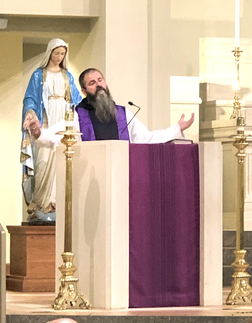
“It was my answer to Pope Francis’ call to outreach,” Father Champagne said, who meets people where they are whether at a restaurant, hospital, nursing home, health club, movie theater, ball game, shopping center, work sites, airports, tailgating at LSU games or even during Mardi Gras.
“I think of it more as evangelization than confession,” he said. “God’s grace works very powerfully. They still have to confess their sins and repent. We’re just making it more accessible.”Father Champagne said because only priests can hear confession and offer absolution and the number of Catholics far outweigh the number of priests, it is important for priests to go beyond the church confessional and go where people are. He said it is following what Jesus taught – leaving the 99 to find the one stray sheep.
“So, we as priests have to do our part to extend (the outreach)” beyond church, said Father Champagne, a priest of 28 years.
He said that’s how the Lord converted Matthew, the tax collector. He encountered him on his turf.
“Matthew got the call,” he said. “The same thing happened to the blind beggar and Zacchaeus. ... The church has to pass by people today. … COVID kind of got everybody in the mode (of not attending Mass) – how do we get to our people when they are not here in church? Find out where they are and reach them somehow.”
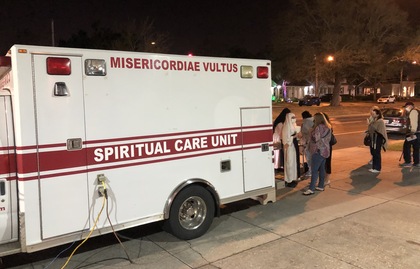 The red light special
The red light special
The way the SCU is decorated catches peoples’ attention. There’s a Divine Mercy Jesus image, the word “confession” imprinted backwards so drivers can read it through their rear-view mirrors and Bible passages from John 20:23 about forgiveness and from Luke about being merciful like the father.“When they see it, they start to think about God outside of the church,” Father Champagne said, especially if they have lapsed from the church. It is a reminder of their faith upbringing and might tug at their heart to revisit the sacrament.
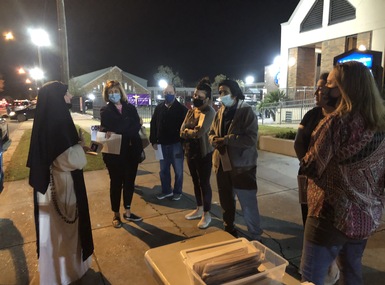
“They respond to grace at the moment,” he said. “The ambulance is an occasion of grace, and God works on their minds.”Father Champagne travels with a “spiritual support team” of his fellow Community of Jesus Crucified religious. This has proven effective, he said. While he is hearing confession in privacy inside the ambulance, the nuns, priests and lay volunteers encounter people outside the ambulance as they wait, offer coffee and encourage and help them with their examination of conscience or to just get a blessing from a priest.
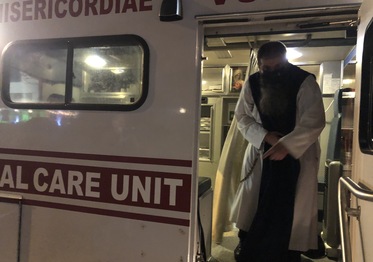 Once inside the ambulance, confessions are confidential, and those confessing have an option to kneel behind a curtain or sit on a bench and talk to Father Champagne face-to-face.
Once inside the ambulance, confessions are confidential, and those confessing have an option to kneel behind a curtain or sit on a bench and talk to Father Champagne face-to-face.“Confession has always been important,” he said, adding that even those who have never committed a mortal sin, like Mother Teresa, regularly confessed.
“The sacrament is powerful,” he said. “It gives us a healthy sense of person – to say, ‘I have sinned’ and take responsibility for it; to go before the Lord, who is so merciful.”
Father Champagne doesn’t see his SCU as replacing confessions in church, by any means. It is just another mode.
“Priests will tell you that you can’t stay at the physical plant, you have to go out, go to them,” he said.
Calls about success
Father Champagne, who attended Notre Dame Seminary, now is a spiritual director for seminarians, teaches the anointing of the sick as part of sacramental theology and offers confession practicums there.He said spreading faith any way you can is his goal. His Community of Jesus Crucified runs Our Lady of Sorrows Retreat Center in St. Martinville, which offers formation of the laity; works with the poor and street kids; ministers to the sick and dying in nursing homes; runs a kitchen and food pantry; and assists in parishes throughout the Lafayette Diocese. They are noted for their annual Bible marathon.
The ambulance ministry’s success has yielded two SCUs plus an old U-Haul he affectionately calls the “Church-Haul.” While they travel mostly in Louisiana, Father Champagne has visited Texas by invitation, and he’s fielded calls from dioceses throughout the United States seeking their own outreach.
“We have to show up in their world with new methods, new vitality and conviction, but the same Gospel,” Father Champagne said. “It doesn’t have to be an ambulance, it could be any vehicle – a golf cart, a tent set up on college campuses and where students are encouraged to ask a priest a question. … You show up in their world and charitably talk to them and they have a powerful experience. Even if they are not convinced, their guard goes down against the church.”




